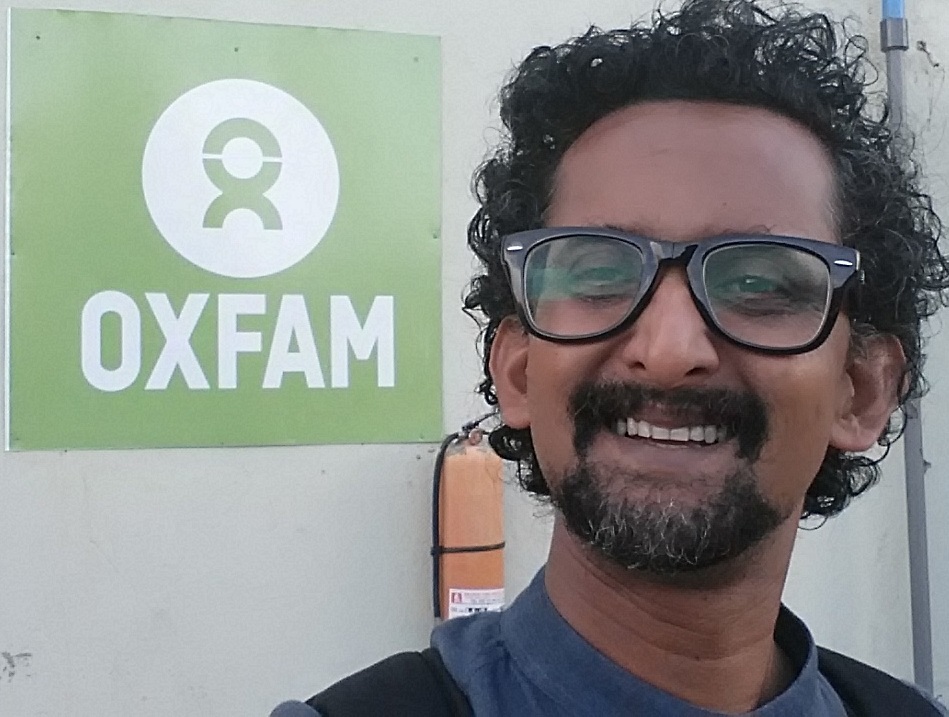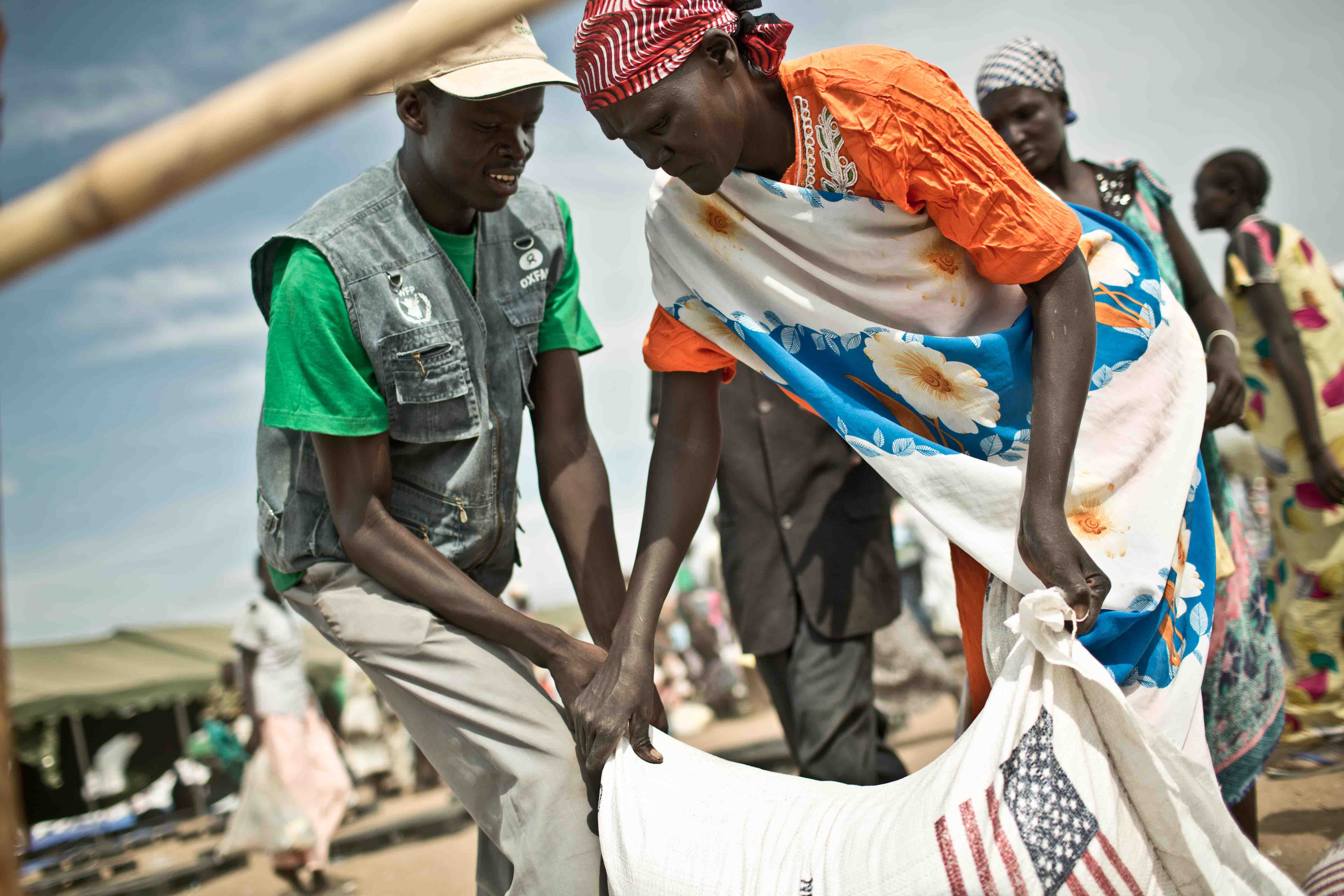
Are you a humanitarian? Humanitarian Aid Workers come from all places and all walks of life. For the occasion of World Humanitarian Day 2015 we talked to some of the Humanitarian Aid Workers in South Sudan, here they tell us in their own words what makes them humanitarians and what drives them to help others.
Matthew Bida, South Sudanese - Emergency Food Security and Livelihoods (EFSL) Team Leader
Matthew is from South Sudan and has first hand experience of being a refugee. “I was a refugee in Kabolgo camp in Uganda from 1993-2003. Oxfam was there, supporting us with food and water and other things. I was able to go to school and grow, but at the back of my mind I knew what I wanted to do with my life. I wanted to be able to help anyone who was in the same situation that I had been. While I’m working in different places in South Sudan, I know we are making a difference, the same way someone made a difference for me. "
Namaru Florence, South Sudanese - EFSL officer
“Around the time we gained independence, I had the privilege of working with fellow South Sudanese returning home from Sudan. There was so much hope. People brought with them dreams and expectations for South Sudan, and for our future. I was inspired just being around them. Their hope was my hope.
That seems like a long time ago. We are now at war, and many of us are lost. Some of us have lost loved ones, and some have been forced to leave their homes. The hope that inspired me is also getting lost.
I am a humanitarian because I believe there is still hope for South Sudan. I have the chance to work with communities to discuss issues that we’re facing and how to rise above them. I believe that the only way to overcome the challenges we face is to listen to each other and to work together. We have to take the journey to a better future together. The answers are all with us.”
 Florence Namaru keeps her hope alive for South Sudan. Photo credit: Stella Madete/Oxfam
Florence Namaru keeps her hope alive for South Sudan. Photo credit: Stella Madete/Oxfam
Emma Jane Drew, Australian - Humanitarian Program Manager
“I wanted to make a difference in people's lives. Working in the private sector in Australia got me thinking, there must be more to work than this. I started exploring how my daily work could have a positive effect on others. Not to say that I wanted to save the world, but make some small influence people's lives. This work helps me to evaluate my own purpose and contribution to the greater good. This is why I enjoy it even now after more than 10 years in humanitarian work getting out to the field and being with the people we support. They are the ones who remind me why I do this work.”
Isabel Martins, Portuguese - Project Coordinator
Isabel is from Portugal and works in South Sudan. “Our work serves a purpose and makes a difference by helping people to claim their right to a dignified and fulfilling life. Rights that are very much taken for granted in Portugal, where I come from. No matter the challenges and often-hard conditions we live under, humanitarians have the privilege to be regularly inspired by the tenacity and spirit of the people we serve.”
Alfred Bekit, South Sudanese - Public Health Promoter
“I belong to a community and that means supporting each other in good and bad times. I started working as a humanitarian to serve the community where I am from. Now I serve any community that needs my help. I help because it is my duty to.”
Khan Wal, South Sudanese - Public Health Engineer
“I became a humanitarian because I know what it feels like to be in need in South Sudan. I felt it when I was working in Juba at the UN base where many like me ran to for safety. And I feel it now in Lankien where many are still suffering. I do what I do because I want to help people in times when they need it the most.”

Khan Wal is a South Sudanese Public Health Engineer. Photo credit: Mette Steen/Oxfam
Naser Shawkat Haider, Pakistani - Program Manager
"I am proud to be a Humanitarian Worker as I have a Billion Dollar satisfaction of using all my knowledge and skills to reduce the suffering of people in great distress, and to protect their dignity in times of crisis."

Naser Shawkat Haider from Pakistan, a Program Manager in South Sudan. Photo credit: Oxfam
Daniel, South Sudanese - EFSL officer Minkaman
"I have experienced war- in 1991 and more recently during the fighting in December 2013. My wife, relatives and I fled from our home town in Bor (Jonglei State) when the fighting started in December 2013. We hid in the bush for ten days, sneaking back into the town to see if the fighting had ended.
There were dead bodies everywhere. We could not go back home. We decided to cross the river Nile and come here to Minkaman. We had a whole life in Bor- I was just finishing my degree in the university; my wife had her own duties. Life was good. Then we had to start all over again in a new place.
Many people came to Minkaman from Bor. They were suffering. I had suffered too. I felt part of them as I understood what they had experienced and what they needed. I soon started working with Oxfam, helping in distributing food to the community.
I help because these people are my community; they are human beings. You can't run away from this. You have to be brave and go through it. People here call me 'man of food'. They know I'm in a similar position as they are, and I am helping."
 Daniel the 'man of food', South Sudanese, EFSL officer Minkaman. Photo credit: Pablo Tosco/Oxfam
Daniel the 'man of food', South Sudanese, EFSL officer Minkaman. Photo credit: Pablo Tosco/Oxfam
Marianne Moller, English - Human Resources
“I do this work because I share the same sense of hope for a better future that keeps the people in South Sudan going. I also want to contribute to a better life for others. This is based on a strong sense of equality: we are all humans and have the same basic ideas about our lives - we all want a home, a safe place to live, and to live in harmony with our neighbors and nature around us. We all shed tears when we experience sadness or intense joy; when the drums play the beat of our heart, we want to dance. If I can contribute in my own way to create a better future for my fellow humans, I feel human, I feel part of our world, and that more than justifies the intense changes, and sometimes feeling a little bit lost.”
Theodros Eshetu Tefera, Ethiopian - Food Security Coordinator
“I know what means to be hungry! I know the weakness and desperation you feel when you are hungry. I studied agriculture, crop and livestock production, to support my fellow brothers and sisters to produce food on their own and be self-sufficient. I feel contented in my heart when I see farmers at the field harvesting their crops, enjoying the fruits after months of cultivation, or people milking cows they have been caring for for over many months or even an entire life time.”